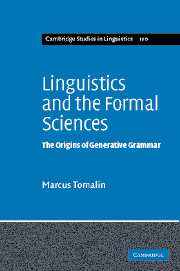2 - The consequences of analysis
Published online by Cambridge University Press: 22 September 2009
Summary
Chapter overview
The purpose of this chapter is to summarise some of the movements within the formal sciences that occurred during the nineteenth and twentieth centuries, and which were ultimately to exert a profound ifluence over the development of TGG. Since the origins of TGG are the main focus of the following chapters, and since any search for origins necessarily entails an infinite regress if taken to an extreme, an arbitrary beginning is required, and the starting point chosen for this discussion is the emergence of the calculus as an identifiable set of algorithmic procedures in the late seventeenth century. Accordingly, the advent of the calculus is discussed in section 2.2 and some of the disputes associated with its appearance are reviewed, along with the main subsequent advances that led to the creation of the branch of mathematics known as ‘analysis’. In section 2.3 various attempts to provide a more secure foundation for analysis are briefly assessed, with particular attention being given to the endeavour to derive the calculus from the rudiments of number theory. The development of set theory, which grew out of the need to secure the basis of arithmetic, is summarised in section 2.4, and some of the resultant paradoxes are explored. The remaining sections of the chapter discuss the three main theories that emerged at the end of the nineteenth century and the beginning of the twentieth century in direct response to the foundations crisis prompted by set theory.
- Type
- Chapter
- Information
- Linguistics and the Formal SciencesThe Origins of Generative Grammar, pp. 21 - 53Publisher: Cambridge University PressPrint publication year: 2006



